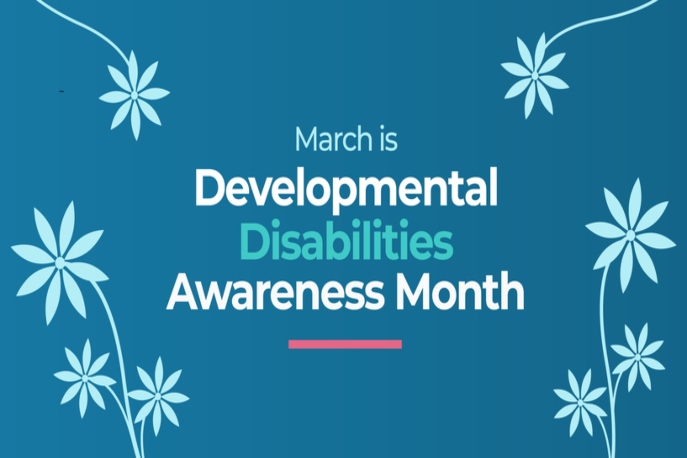Credit: Carl Lokko
“We might not be able to do something but through training and exercise and time, we can learn how to do it. We can evolve to do it, it just takes that effort,” said RJ Mitte, Breaking Bad actor and disability activist with cerebral palsy. Too often, the burden of “effort” is placed on people with disabilities, but not on the employers who are able to clear obstacles away from applicants and colleagues with disabilities. This Developmental Disabilities Awareness Month (DDAM), RALIANCE is investigating the ways employers can be more equitable towards people with developmental and/or intellectual disabilities.
While RALIANCE has discussed disabilities in the workplace previously, we have not addressed the specific needs of those with developmental disabilities. A developmental disability is one that appears at birth or during early stages of development and lasts a lifetime. This can encompass physical disability, intellectual disability, or both. An intellectual disability limits certain types of cognition such as problem-solving, sense of time and money, and adapting to everyday social and interpersonal interactions. Examples of disorders that fall under the developmental disability umbrella include Autism, Cerebral Palsy, Down Syndrome, Fetal Alcohol Spectrum Disorder (FASD), and Prader-Willi Syndrome (PWS). All of these disorders fall on a spectrum and manifest in different ways for different people, so it is important to never presume one’s capacity to learn or adapt to a role based upon their disability.
In 1987, Congress designated March as National Developmental Disabilities Awareness Month. Since then, the National Association of Councils on Developmental Disabilities has used the month to carry out a month-long campaign which sheds light on disability pride, emphasizes the importance of inclusion, and draws attention to the barriers and issues still faced by the 7.3 million people in the United States with an intellectual or developmental disability (IDD). One largely underdiscussed issue is the intersection of disability and sexual assault, which impacts a staggering 90% of people with developmental disabilities. This is just one example to demonstrate how our society and culture commits or allows harm to befall people with developmental disabilities and must serve as a cue that we all need to play a part in creating environments that promote the safety, equity, and well-being of all.
While workplaces are often the ones who can cause harm, they’re also capable of minimizing it. Below we’ve identified some ways that workplaces can work for everyone, regardless of ability.
–Have a Policy Overview: Consider reevaluating your policies and procedures to encompass disability-related discrimination. RALIANCE would be proud to work with you to find ways to modify your policies and procedures to make them more equitable to all of your colleagues.
–Create Accessible Job Postings: While you may know of captioning or image description for deaf and blind users respectively, did you know that there are ways to make sites more cognitively accessible? The World Wide Web Consortium (W3C) Web Accessibility Initiative (WAI) lays out a variety of ways to do so like making information visually and audibly distinguishable from the background, making page content adaptable without losing information, and making pages more predictable to navigate.
–Commit to Non-Discriminatory Hiring Practices: Provide sensitivity and informational training to the hiring managers at your organization, emphasizing through job postings and company materials that you are an equal opportunity employer. Additionally, as mentioned in our previous disability support blog, “Employers can take the initiative to bring all qualified applicants to the table by reaching out to the Employer Assistance and Resource Network on Disability Inclusion, state-specific vocational rehabilitation agencies, and the Workforce Recruitment Program managed by the U.S. Department of Labor’s Office of Disability Employment Policy and the U.S. Department of Defense.”
–Provide Introductory Programs/Other Forms of Coaching: One way to demonstrate your commitment to accessibility is providing new hires with developmental disabilities work trials, coaching, and shadowing opportunities so that they can more easily adapt to the duties of a new position.
–Shift Language: Language is a powerful tool that can be used to exclude or include, even when the speaker may not realize it. Shifting one’s language to be inclusive, informed, and welcoming makes workplace culture equitable for everyone, particularly those with developmental disabilities. See the United Nations’ Disability Inclusive Language Guidelines for more information.
–Pay Fairly: The U.S. Bureau of Labor Statistics revealed in 2023 that just 22.5% of people with a disability are employed. Of those employed, many earn less than the federal minimum wage ($7.25). Consult with payroll to ensure that your pay is not only not exploitative, but equitable.
–Provide Accessible Technology: In addition to making web pages more accessible, invest in technologies/devices necessary for your employees to complete their job satisfactorily. This may include speech-to-text or text-to-text software, noise-canceling headphones, reminder systems, among others.
–Have Avenues to Report Harassment: In the United States, “61% of disabled employees have experienced discrimination or bias in their workplace.” Assure all your employees that any reports that they make will be taken seriously and that harassment of any kind is not tolerated at your workplace.
–Forge Relationships With Relevant Community Partners: After consulting all of these tips, you may still have questions. This is why it’s important to connect with community partners in the disability advocacy space in your area. Your organization can also consult Stanford University’s National Disability Organization and Resources page to connect with experts whose expertise fit most closely with your colleague’s needs.
This year’s DDAM theme is “A World of Opportunities.” This month, let’s all pledge to provide a world of opportunities and options for our peers with disabilities!
RALIANCE is a trusted adviser for organizations committed to building cultures that are safe, equitable, and respectful. RALIANCE offers unparalleled expertise in serving survivors of sexual harassment, misconduct, and abuse which drives our mission to help organizations across sectors create inclusive environments for all. For more information, please visit www.RALIANCE.org.

